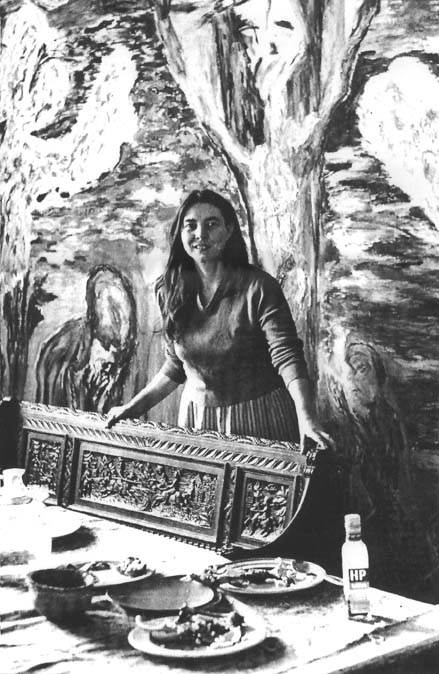 |
Obituaries |
Obituaries
She became a psychiatric cause celebre through the interest of the radical psychiatrist RD Laing, for whom she was an early patient; through her paintings, which were exhibited throughout Britain and Europe; and through her lectures on mental health issues in Europe and America,
Born and brought up in Portsmouth, where her father was a laboratory technician Mary always said that her Parents were "abnormally nice", but that she never felt much love or affection at home. Educated at local schools, she trained as a nurse and, during the second world war, joined the army as a nursing sister, spending a year in 1945 working in hospitals in Egypt and Palestine before returning to Britain and London hospitals.
She suffered her first breakdown in 1952, and was admitted to a chronic ward at St Bernard's hospital, Southall, where she was diagnosed as schizophrenic. She was, however, discharged after a year and returned to work as a nursing tutor. A devout Catholic, her plans to take a nursing education MA at the National Catholic University, Washington, were thwarted when the United States embassy in London refused her a visa, citing her mental history.
Mary continued to nurse and teach but unable to keep up with the demands of life on the ward, worked, for a time with mentally handicapped children.
Because she had always felt no real bond with her parents, particularly with her mother, Mary was drawn to the theories of the psychiatrist James Robertson, who had worked with the eminent child psychiatrist John Bowlby at the Tavistock Clinic in London, and made two influential films on child separation: A Two-Year-Old Goes To Hospital and Going To Hospital With Mother. Mary had used them on nurses training courses, and, when Peter, her 16?year?old brother, was diagnosed with schizophrenia, she wrote to Robertson.

In 1963, after reading Laing's book, The Divided Self (1960), she asked Robertson to help her contact Laing, who, she felt could help both Peter and herself; for the next year, she saw Laing for regular sessions. No longer able to work, she stayed at the Richmond Fellowship hostel, although her behavioural problems meant that staff found her increasingly difficult to deal with. After a few months at a Carmelite convent outside London, she worked part-time at a London youth hostel.
In 1965, Mary moved to Kingsley Hall, at Bromley-by-Bow, a psychotherapeutic centre set up by Laing and his colleagues as an alternative environment to psychiatric hospital. Although she man aged to get Peter admitted as a resident, it was not a successful stay and he left after a few weeks. He died in the 1980's. From 1965 - 70, Mary was a patient of Berke at Kingsley Hall, and underwent regression therapy with him. It was during this time that she discovered her gift for painting, first using her own excrement, and then oil paints. As her condition improved, she worked with Berke on their book. Her canvases, full of vivid colour - and often depicting religious imagery - were first shown in 1969 at the Camden Arts Centre in London. "My paintings are an important part of my life, which lay buried for 42 years", she said.
After 1970, when Kingsley Hall dosed, Mary helped Berke, who was a prime mover in setting up the Arbours Crisis Centre in north London. By now, she was having regular exhibitions and, during the next two decades, showed her work worldwide, usually accompanied by a talk on mental health and her experiences. She also lectured on mental health issues and the benefits of psychotherapy, particularly in Sweden and the US.
In 1985, Mary moved to Scotland, where she continued to paint and exhibit. Something Sacred, her book of conversations, writings and paintings, was published in 1989. After contracting spinal arthritis, she was confined to a wheelchair, but continued to paint, write poetry and travel. In 1993, she moved to Tomintoul, in the highlands, and became a familiar sight in the village, where she insisted on paddling her wheelchair backwards down the middle of the street.
Mary was an extraordinary person, full of humour and vitality, exhibiting and encouraging younger painters well into her 70s. Sven Bjarnason
David Edgar writes: I met Mary Barnes through an actor who wanted to play her. Shortly after she had been in a play of mine about baby snatching, Patti Love presented me with a copy of Mary and Joseph Berke's book about Mary's journey through madness, with the idea that I might like to adapt it for the theatre. Accordingly, I approached Berke - and, through him, Mary herself.
Although she had some amendments to propose, she was extremely generous about a subsequent script, which showed her screaming, assaulting people, smearing bodily fluids on the walls and - on one occasion - entering stark naked, covered in her own shit. Her most pressing concern was for her brother, Peter, who had spent a life in the kind of institutions she had avoided.
When we began rehearsals, Mary first sought out the actor David Gant, who was to play Peter. Then she met Patti, and the two of them disappeared into the theatre paintshop, where Mary taught her the technique of finger-painting with which Patti was to splatter the front row of the audience, first at the Birmingham Rep, and later at the Royal Court, London.
When Mary died, several people asked, as if in an afterthought, if she was cured. Certainly, Mary was able to undertake those practical life tasks that were beyond her in madness. But she was never, and could never, be cured in the sense of returned to normal. Still passionate, intense, demanding and self-obsessed, she was also generous, funny and kind. It was a privilege to tell her story.
Mary Barnes, artist, poet, nurse and mental health campaigner, born February 1923; died June 29 2001